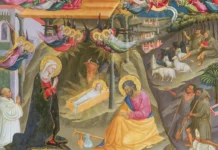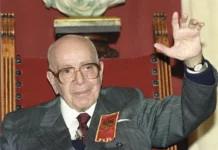
Since his time in school, where he learned about the life and work of St. Ignatius of Loyola, Dr. Plinio had great devotion to the founder of the Society of Jesus and an enthusiastic admiration for his adamantine logic and clarity.
When we analyse St. Ignatius of Loyola’s way of being and acting, we realize that his love and enthusiasm for the institutions and teachings of the Church imparted reflections of those perfections to his own soul, without, however, impinging on his personal characteristics.
Enriching his own vocation and charism
For example, we can imagine him being enchanted by the way a Pope took care of a vast range of matters with complete calm and assurance, leading the Catholic world with a steady hand. For example: writing a bull for the centenary of a university or a famous Catholic establishment; authorizing the erection of an apostolic prelature in the missions; resolving a problem of relations with one country or a religious crisis in another; settling a matter of corporations involving a rather delicate moral problem, and so on. The most diverse actions of the Supreme Pontiff spoke intensely to the soul of St. Ignatius.
He was especially filled with wonder to discern the action of the Holy Spirit: powerful, wise, serene and immense; hovering over the Spouse of Christ and governing her. As his admiration grew, the work of the Paraclete was carried on in St. Ignatius, and something of this quality of the Church began to live in him, making him capable, to a certain extent, of acting in the same way.
It could be said that a supernatural force dwelt in him from then on, making him even more himself, because his vocation and his specific charism were enriched. It may seem paradoxical that something extrinsic could become inherent to him, guiding his life. Did not this make St. Ignatius into an automaton? In my opinion, the opposite was true. He became more St. Ignatius of Loyola.
The rule applied to his disciples
It is interesting to note that what St. Ignatius experienced also took place, within due proportions, between him and his disciples. When we read the history of the Society of Jesus, we see that the founder tried to form the mentality of his followers according to what he drew from the Church, guiding them towards perfection.
And the Jesuits, in turn, sought to conform themselves to St. Ignatius, many of them attaining a heroic degree of virtue. Let us recall, for example, St. Francis Xavier, as one of the first, and later St. John Berchmans, St. Aloysius Gonzaga, among others.
Indeed, one has the impression that in the Society of Jesus, this union and this conformity of soul was expressed in a particularly rigorous and emphatic manner – more than in other religious Orders in relation to their respective founders, and for good reason.

At the time when St. Ignatius was raised up by God to advance the Counter-Reformation, some aspects of the Church’s life seemed so altered that, in order to have a perfect knowledge of it, one needed to know and have a special bond with a truly Catholic person. This form of personal contact was the means for the Church to maintain its influence on the spirit of the faithful.
And for the Jesuits who had St. Ignatius as their model, the union with the Church took place through the influence of the person of their founder, grasped, with the help of grace, in moments of enthusiasm, and assimilated, in the proper sense of the word, through meditation and reflection.
Therefore, in order for a 16th-century Jesuit to avoid contamination by the erroneous ideas of the time, he had to consider the facts through the eyes of St. Ignatius.
Doctrine personified
On the other hand, it must be granted that for a Catholic, it is most desirable to come into contact with doctrine personified. This need is also easily explained.
Imagine someone who studied a compendium of Church doctrine, but had never seen a good Catholic. He would not possess a perfect notion of the Church. Now suppose the opposite: someone who was very closely acquainted with a Catholic person, but had not yet studied that doctrine… It could almost be said that the one who knew the good Catholic understood the Church more than the one who analysed only her doctrine.
From this perspective, let us picture a conversation between Jesuits about the writings of St. Ignatius. They should not study the Ignatian text as any critic would, that is excluding the factor of enthusiasm. No. Rather, they should try to discern the mentality of their founder when he conceived it, and ascend to loftier cogitations. For example, they should consider that the prototype of that style was superabundantly present in his soul and his book or prayer was a merely a sample of it.
They should understand that St. Ignatius was capable of writing to an eminent ecclesiastical authority, with an energetic and affirmative tone, calling his attention to attitudes that caused perplexity in fervent Catholic circles, and then to employ shrewdness in resolving a serious problem, without losing anything of his seriousness, gravity and firmness.
The Jesuits, if faithful to their vocation, had to admire these qualities of their founder, to conform to them, to be enchanted by his enthusiasm for the Church; they had to strive to see the Holy Spirit’s action instructing and guiding the actions of the great St. Ignatius of Loyola.

Delight with the rationale of a Jesuit teacher
I cannot shy away from giving a personal example of one who – although not a Jesuit – felt enthralled, at an early age, by the luminous logic of St. Ignatius and wished to acquire it for life.
When I attended St. Louis College, one of the subjects was taught by a young teacher, yet a seminarian of the Society of Jesus, whom we called Master Costa, later Fr. Costa. He expounded arguments of an apologetic nature, explaining one point after another, and I was enthused to see the coherence of his thoughts: concatenated, decisive, advancing in resolute and direct steps towards the conclusion. It was my first enchantment with logic.
I perceived the agile, lucid and powerful process of reasoning in the mind of Master Costa, and I rejoiced in admiring a soul, an intelligence that operated like this. Furthermore, I felt a veritable relief inside me, as if something long stagnated was stirred and set into motion. It was a kind of liberation, given that my habitual surroundings were very little inclined to logic, lacking in reflection, and fond of impressions: “I think that… maybe it is… it would seem to me that…” Without realizing it, my temperament desired a different attitude of soul; it demanded a definition. Affirm! Stick out your chest and take responsibility for the conclusion: say it is so, and subject closed.
Now, in Master Costa’s ratiocinations there was this: he concluded them, in such a way that the interlocutor was caught fast in his conclusion, with no possibility of escape. I said to myself: “One day I will also know how to draw a conclusion like Master Costa!”
My enchantment was all the greater when I realized that the teacher reached conclusions with which many were at odds. In general, the so-called “strong minds,” moustachioed, flamboyant men with domineering airs, who believed the age of religion was over. Well, Master Costa began to lay out his argumentation, thought by thought, crushing and silencing his opponent, to the great delight of my soul.

Enthusiasm for Ignatian logic
In the midst of his commentaries, this logic had a special brilliance when he praised the Company of Jesus and St. Ignatius. I thought:
“You see? This man is Brazilian like me, and he has drawn his mental capacities from this same Brazil in which I am. If he possesses this logic within his soul, he did not obtain it from the tide of relativism that has largely eroded the present mentality, but rather from St. Ignatius, whose son he is. The founder of the Jesuits granted him this gift.
“Now, if I admire St. Ignatius assiduously, who knows, perhaps he will also grant me a little of that logic? It depends on whether I am very pure, entirely pure, uncompromisingly pure… Because this spirit is not given to those who are not chaste. If I persevere in the practice of chastity, a logic like that of Master Costa, and like that of St. Ignatius of Loyola, will begin to develop in me. Let’s forge ahead! I have acquired my enthusiasm!” ◊
Taken, with slight adaptations, from:
Dr. Plinio. São Paulo. Year IX. N.100 (July, 2006); p.60-65






